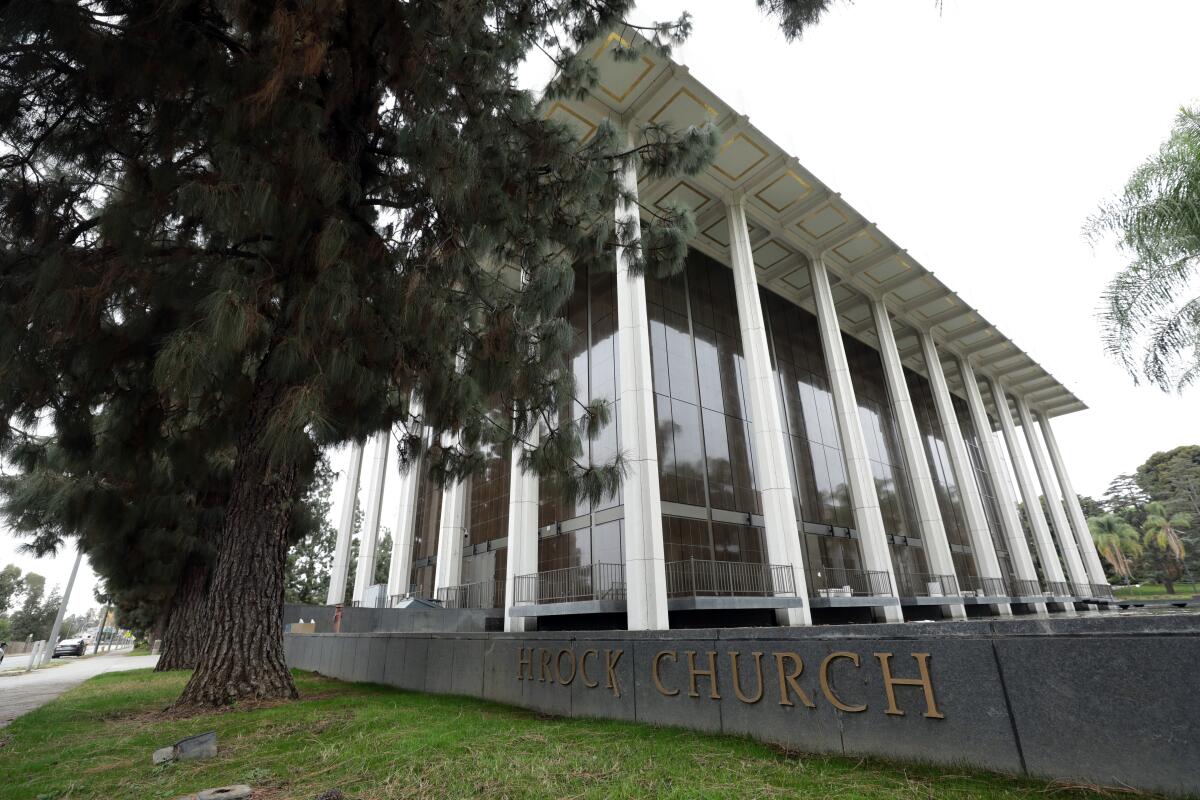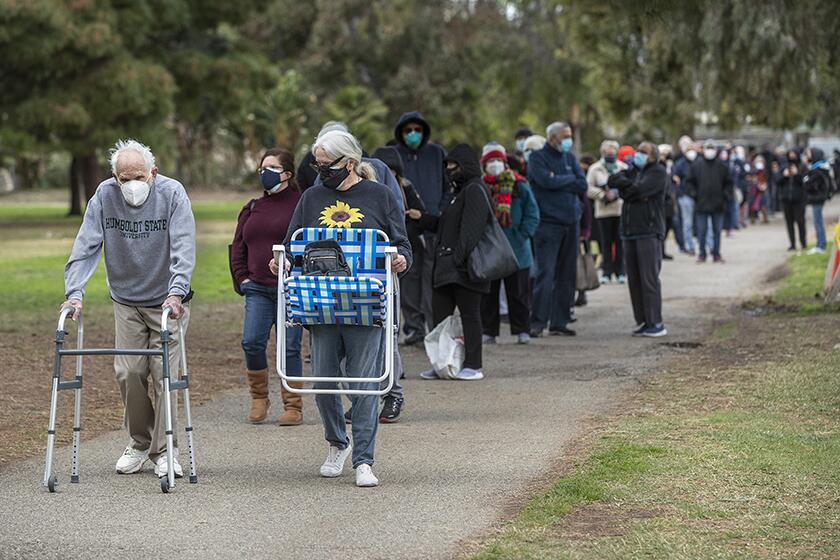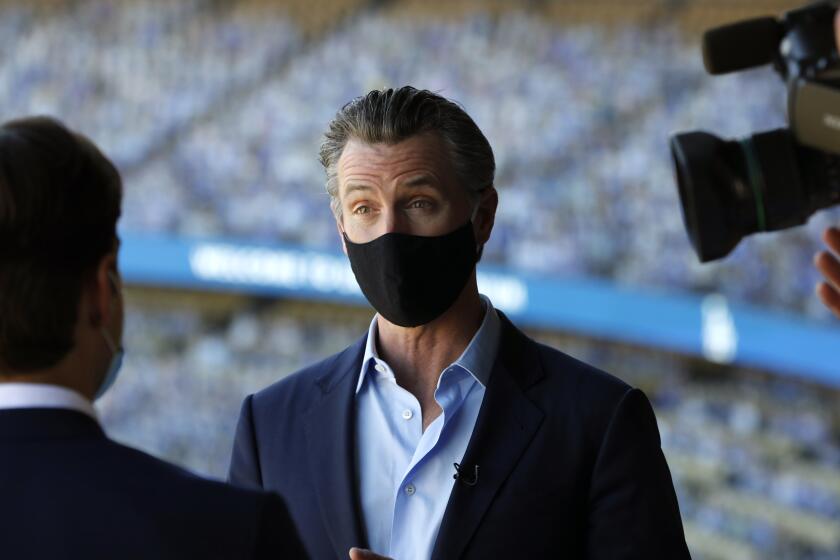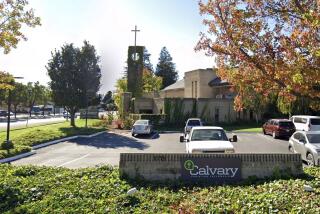Some California churches will reopen Sunday after Supreme Court lifts ban on indoor services

- Share via
Some California churches on Saturday said they planned to reopen their doors this weekend after the U.S. Supreme Court lifted the state’s ban on indoor worship services during the pandemic, ruling that Gov. Gavin Newsom’s strict orders appear to violate the Constitution’s protection of the free exercise of religion.
Bishop Arthur Hodges, senior pastor of South Bay United Pentecostal Church in the San Diego suburb of Chula Vista, called the ruling “a major victory.”
“We are thrilled and excited to go back to church without legal threat of fines or arrest,” Hodges said in a television interview broadcast on Fox 5. “And it opens up churches in the entire state of California. So this is a win for every church, every house of worship and every individual of faith that wants to go to their house of worship this Sunday.”
He said the church would hold indoor services this weekend. It had previously offered online services but they were not an adequate substitute, he said, likening them to a virtual campfire or tele-health medicine.
“Online can only go so far,” he said. “It really doesn’t satisfy the person of faith who’s needing their church.”
South Bay United Pentecostal was one of two churches that challenged the state’s ban in separate lawsuits. The other, Harvest Rock Church in Pasadena, said it would also hold indoor services Sunday.
“While we have come under fire from some community members, we stand firm that the fruit of meeting in person lies in the spiritual, emotional and physical healing that worshipping the Lord Jesus Christ has brought to so many throughout the world,” Ché Ahn, the church’s senior pastor, said in a statement.
He said the church decided to challenge the ban after it was singled out by “confusing California edicts” that give “first-rate essential preferences to abortion clinics, marijuana dispensaries, and liquor stores.”
“While it is one thing to lock down based on data, it is an entirely different motive to allow some groups a right that is denied to others,” he said.
Gov. Newsom’s office said Saturday it will issue revised guidelines for indoor church services.
“We will continue to enforce the restrictions the Supreme Court left in place and, after reviewing the decision, we will issue revised guidelines for worship services to continue to protect the lives of Californians,” Daniel Lopez, Newsom’s press secretary, said in a statement.
The justices in a 6-3 decision granted an appeal late Friday evening from South Bay United, which has repeatedly challenged the state restrictions on church services, including its ban on singing and chanting. The ruling set aside decisions by federal judges in San Diego and San Bernardino, and the U.S. 9th Circuit Court of Appeals in San Francisco, which upheld the state’s orders despite earlier warnings from the high court.
But the high court said the state may limit attendance at indoor services to 25% of the building’s capacity, and singing and chanting may be restricted as well.
California has enforced “the most extreme restriction on worship in the country,” the court was told by the Becket Fund for Religious Liberty. While several states set limits on attendance at church services, the group said, California is “the only state to ban indoor worship” in all but sparsely populated counties.
The six conservative justices in the majority differed among themselves, but they agreed California had singled out churches for unfair treatment.
“Since the arrival of COVID-19, California has openly imposed more stringent regulations on religious institutions than on many businesses.” wrote Justice Neil M. Gorsuch in one of three concurring opinions. “California worries that worship brings people together for too much time. Yet, California does not limit its citizens to running in and out of other establishments; no one is barred from lingering in shopping malls, salons, or bus terminals.”
Gorsuch along with Justices Clarence Thomas and Samuel A. Alito Jr. voted to lift all the restrictions, including limits on attendance and singing.
Justice Amy Coney Barrett said she was not convinced the ban on singing should be lifted. The state argued that singing in a group indoors will spread the airborne virus, and Barrett said the churches had the burden of “establishing their entitlement to relief from the singing ban. In my view, they did not carry that burden — at least not on this record,” she wrote. Justice Brett M. Kavanaugh agreed with her.
In May, Chief Justice John G. Roberts Jr. cast a key vote in a 5-4 decision to reject an early challenge to California’s restrictions on church services. He said then that he believed in deferring to state officials who were coping with the pandemic. But he wrote Friday that he could not accept California’s “present determination that the maximum number of adherents who can safely worship in the most cavernous cathedral is zero. ... Deference, though broad, has its limits.”
Military troops are headed to California to boost the vaccination effort as President Biden uses wartime powers to address the crisis.
The state’s ban on indoor services was challenged in separate lawsuits by the South Bay United Pentecostal Church and the Harvest Rock Church, and Friday’s order applies directly to them. But its legal logic would block enforcement of a similar ban at other churches.
The court’s three liberals — Justices Elena Kagan, Stephen G. Breyer and Sonia Sotomayor — dissented.
“Justices of this court are not scientists. Nor do we know much about public health policy. Yet today the court displaces the judgments of experts about how to respond to a raging pandemic,” Kagan wrote. “The court orders California to weaken its restrictions on public gatherings by making a special exception for worship services.”
Two months ago, the justices put Newsom and the 9th Circuit on notice that the state’s ban on indoor worship services may have gone too far.
On the eve of the Thanksgiving holiday, the high court struck down part of New York Gov. Andrew Cuomo’s COVID-19 rules, which limited gatherings at houses of worship to 25 persons in a few neighborhoods in Brooklyn and Queens where the virus was spreading rapidly. It said the state’s rules “single out houses of worship for especially harsh treatment” compared to retail stores, the court said in Roman Catholic Diocese vs. Cuomo.
Eight days later, the justices granted an appeal from the California churches and told federal judges to reconsider their decisions that had upheld Newsom’s ban on indoor church services in all of the state’s heavily populated counties. The justices “vacated” or set aside those decisions based on their ruling in the New York case.
But two district judges and the 9th Circuit Court upheld the state’s restrictions again in late January. They said California was facing a steep rise in COVID-19 cases, and they agreed with the state that worshipers at indoor church services posed “an exceptionally high risk” of spreading the virus because people were gathered together for an hour or more.
By contrast, “patrons typically have the intention of getting in and out of grocery and retail stores as quickly as possible,” the 9th Circuit said. The state also argued that churches were free to hold services outdoors.
Lawyers for the churches urged the Supreme Court to grant an emergency appeal and lift the state’s restrictions on worship services. They cited a dissent from one of the 9th Circuit’s senior conservatives.
As Newsom faces the growing threat of a recall, California Republicans in Congress say he’s wasting taxpayer money in the state unemployment program.
“A simple, straightforward application of these controlling cases compels what should be the obvious result here: California’s uniquely severe restrictions against religious worship services — including its total ban against indoor worship in nearly the entire state — are patently unconstitutional and should be enjoined,” wrote Judge Diarmuid O’Scannlain in Harvest Rock Church vs. Newsom.
“California is the only state in the country that imposes such a ban,” he said, “Yet, in exactly the same locales where indoor worship is prohibited, California still allows a vast array of secular facilities to open indoors, including (to name only a few): retail stores, shopping malls, factories, food-processing plants, warehouses, transportation facilities, childcare centers, colleges, libraries, professional sports facilities, and movie studios.”
The two sides in the case differed on the current situation in Los Angeles County. Lawyers for the churches told the court that in late December, Los Angeles County said it would not enforce the restrictions on church services, citing court rulings. But the state’s lawyers said the county did not have the authority to waive the state’s rules.
More to Read
Sign up for Essential California
The most important California stories and recommendations in your inbox every morning.
You may occasionally receive promotional content from the Los Angeles Times.

















